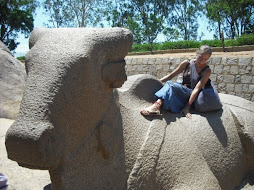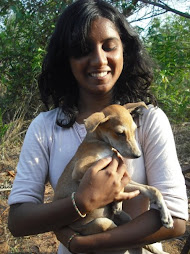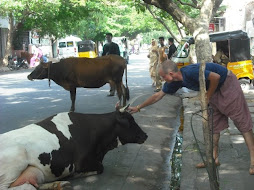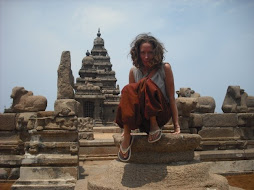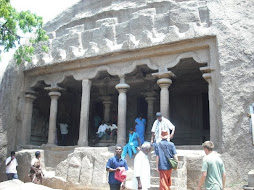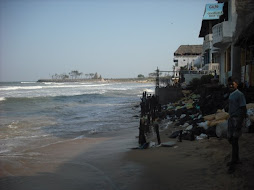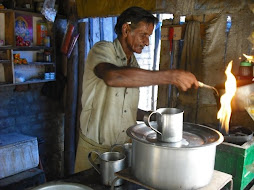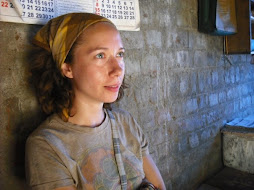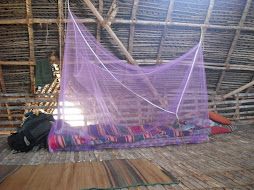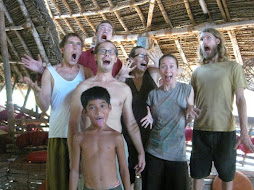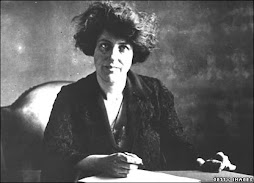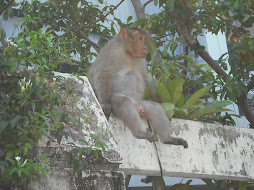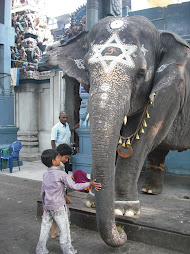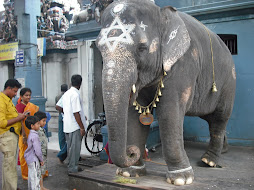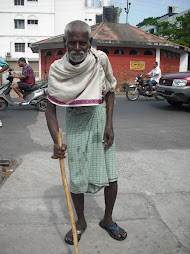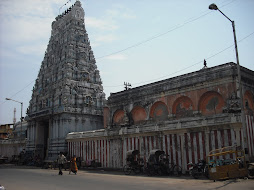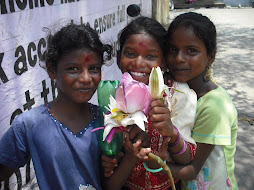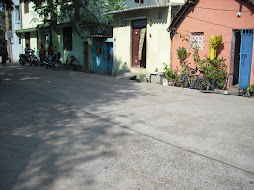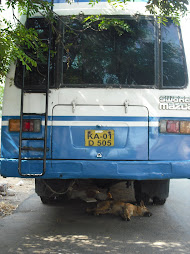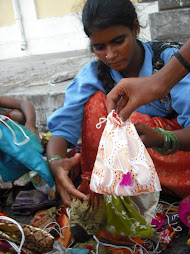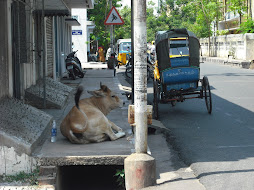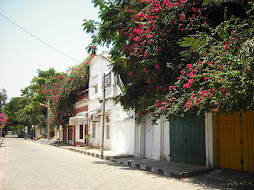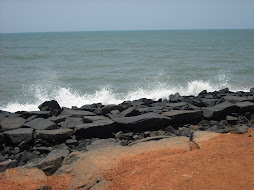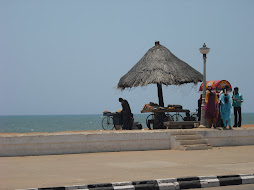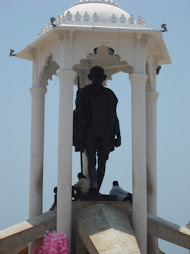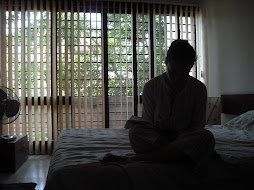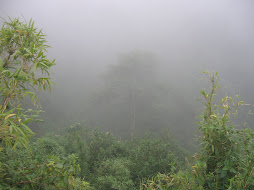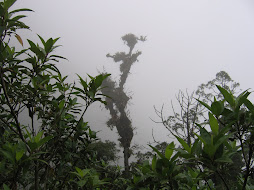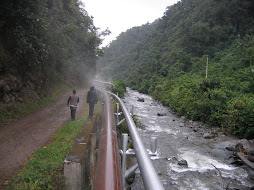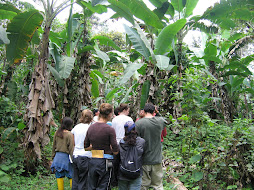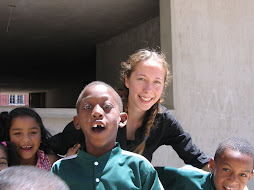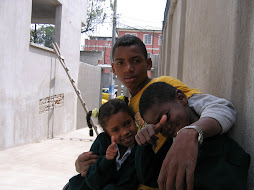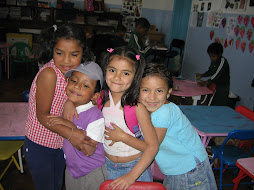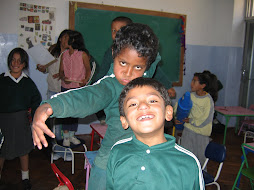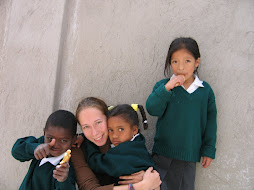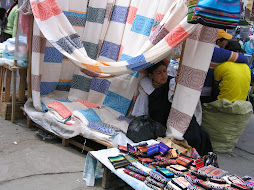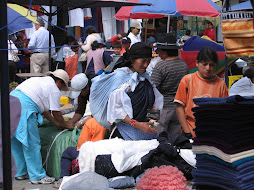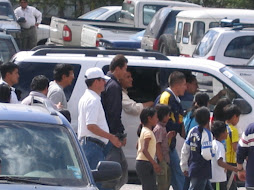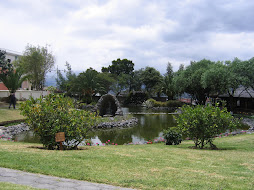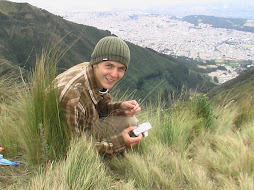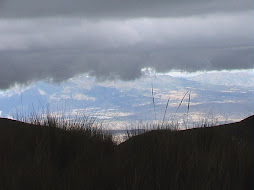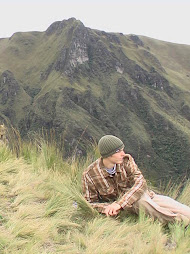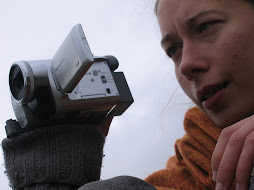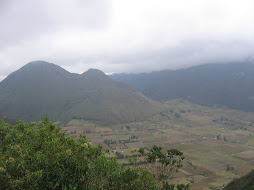I went to India with absolutely no expectations. I'm convinced that's the best way to travel. I'm amazed at the situations I encountered, the amount I grew, and all the people so full of love that became my friends. This has been one of the best experiences in my life.
I haven't written for the past month because I had fallen in love with Sadhana Forest. I highly recommend it to anyone who wants to have a life changing experience. To begin with, Sadhana Forest is a five-year-old project set to rebuild an almost extinct forest - the dry tropical evergreen forest - which is native to Sri Lanka and the south of India. The land in this part of Auroville was severely eroded when the project was started. Looked like the surface of Mars, with a tree here and there. It's so inspirational to see how green the land is already and to know that it's this way because of volunteers (a league that I became a part of and I'm so proud to think that I'm helping to push the project forward). The project isn't self-sustaining yet, because we only recently planted our garden - so we have to buy local produce. Sustainability is a main goal of Sadhana. Now, it takes me forever to go shopping because every item I pick up, I think about whether it promotes sustainability of the earth or not. I'm probably not much fun at parties because I talk about it way too much.
The daily schedule went as such: wake up around 5:30 (a person volunteers to wake everyone up by singing outside of their hut), 1st Work from 6:00 - 8:00, breakfast from 8:00 - 9:00, 2nd Work from 9:00 - 11:00, lunch at noon, dinner at 6:00. It was all really easy going. The other volunteers were fellow travelers from around the world, and all volunteers with special knowledge or talents were invited to have workshops throughout the week (I had a friendship bracelet making workshop). Good conversations were non-stop available. It was easy to make friends. Always easy to get away for a cup of iced coffee and a nutella crepe in Auroville. Weather was hot, but perfectly hot in my opinion. The positivity that was pumped out of this town and this project, I've never experienced before. It's seriously awe-inspiring. It was, if I'm remembering correctly, 150 rupees a day to stay there - which paid for three vegan meals a day. 150 rupees is, like, $3. So, you pay for your food, but housing is paid for by your volunteer work. We slept in huts, on mattresses and under mosquito nets. It was very open and airy and the nights were beautiful. Malaria isn't a problem in this area, so you don't have to worry about that. I learned how to live with germs. Now, I get weirded out by all the anti-bacterial things we have. I feel like they're counter-productive and just force super bacteria to produce. (See what I'm talking about - I get on these rants - you can't take me anywhere).
Now that I've returned, I haven't been experiencing the reverse culture shock I was expecting. Maybe it gets easier with each journey. When you return home from a life changing trip abroad, there's a conflict of identity. Identity is the collaboration of expectations all of your friends and family have of you. You are the roles that you play. When subtracted from your usual home, you have the opportunity to exist beyond expectations and it's an expectantly freeing feeling. You have the inkling that you're frolicking in a cloudy half-way real life, you encounter situations that are more entertaining, more romantic, more frightening, more inspirational than the best of films. I've had to ask myself, "Is this real? Am I in a dream?" and when I reassure myself I'm in reality - I don't know, it's just weird to realize life can be so amazing, so easily. I think this feeling of freedom from the usualities of life, creates a chronic traveler. I think I've developed into a chronic traveler.
I was just talking to an old friend from Portugal about her feelings after returning from a trip to Africa. She was feeling weird about not being able to follow a conversation with her friends because she felt like she vibrated at a different frequency. She's been studying to be a journalist, but now after a one week project helping children in Africa, she feels like her whole life has changed. Her desires and life plan have changed, and to be so easily changed scares her. It's a mix between a quarter-life crisis and reverse culture shock. About this quarter-life crisis plague of my generation - I have so many friends, like myself, that have graduated college and have no idea what they want to do with their lives. 'Married with children' is no longer the go-to lifestyle, but we're not exactly sure what to replace it with. It's a dangerously aged time to not know what to do with your life. I want to have an alternative lifestyle of living away from my credit score and the expectation of a house and kids. I would really enjoy finding a way to continue going around the world, helping out with meaningful projects and filling my elastic mind with new info.
I'm not exactly sure what do with the rest of my life. I'll have to leave that to a 'To be continued...' status. I can say with all certainty that I am the happiest I have ever been. Life continues to unfold itself to me to be absolutely gorgeous and profound. The whole thing blows me away sometimes. Even the crushingly sad times of death and hardship are strikingly profound and beautiful. About a third of my natural life is over with, and I couldn't be more happier with how it's played out. I just hope that I continue to do things that make me proud, and that I don't fall into a rut of possessions that make me forget about the true beauty of life and love.
Monday, June 22, 2009
Monday, May 4, 2009
May 04, 2009
I'd like to begin this with a birthday shout-out to my brother Mike. Happy day-before-your-17th-birthday!!! I'll get you a present when I get home because you'd probably prefer an X-Box, or something, instead of a piece of Indian Tribal Art. Am I right? Speaking of birthdays and art, I found myself at a birthday party last night for a one-year-old I didn't know. He was a bad conversationalist because of his limited three word vocabulary, so that was a little awkward. Also a little awkward was that everyone else there spoke French, which I have like a limited three word vocabulary of now. Manoj Dixit, good friend of the proud parents, took me there. Earlier in the morning Linda had introduced me to said Manoj. "He's like a second son to me," she said. I was itching to see art and he is a very talented artist. He very kindly took me about town to see his artwork - you can check it out online at http://www.paper-boat.com/ - there are some pieces that I would kill to have. His workaholic approach to it all has instilled a new work ethic in my own approach to art and writing. I had starting writing a book awhile back after that inspiring Warhol exhibit in Ecuador (some may remember that old post two years back of me dancing inside a giant soup can). I picked that work back up and I've really been chugging away at it. The book should be finished within this year and it's tentatively titled, "Woke Up This Morning To Find Myself Dead -or- A Ghost's Guide To The Art History Of Rock 'N Roll". I have always been a fan of long-winded titles. I think that's why I listen to artists like Morrissey (preferably with 'The Smiths') because he had songs with titles like, "That Joke Isn't Funny Anymore" and "We Hate It When Our Friends Become Successful". So far I am very proud of the novel and it's full of cool info on art, music and philosophy, so I hope you'll like it too. Keep your expectations in the sky and your ears to the ground.
I'm thinking of making a trip to the cemetery today. I found out that Woodrow Wilson's oldest daughter, Margaret, is buried here in Pondicherry. She found a book of Sri Aurobindo's in a New York library and was hooked on his ideas. Margaret moved to Pondicherry in the 1930s to study under him. She typed up some of his notes and washed his dishes. She wrote of her meditation here, “Sometimes I feel as if the Divine were whispering to my soul, and I, in order to catch the faintest word, am listening as I have never listened before.” She loved it so much here that she refused to leave when she began having the same kidney problems that killed her mother. She died in 1944 and is buried in the Protestant section of the cemetery. It seems wild to me that a presidential daughter is buried in this Indian nook. She wrote, "my soul brought me here where it belongs" which I think would be a fantastic memorial to stamp into her tombstone.
I kept putting off my trip to Auroville for the simple reason of not having a phone to call a taxi. Linda was going to call for me, but I would always remember to remind her far too late in the night. Anyway, problem solved. Mosquito net packed, flashlight charged, I'll be leaving tomorrow morning. There's a slight possibility that I'll be out of communication for the next two weeks, so keep your thoughts positive if you don't hear from me.
I'm thinking of making a trip to the cemetery today. I found out that Woodrow Wilson's oldest daughter, Margaret, is buried here in Pondicherry. She found a book of Sri Aurobindo's in a New York library and was hooked on his ideas. Margaret moved to Pondicherry in the 1930s to study under him. She typed up some of his notes and washed his dishes. She wrote of her meditation here, “Sometimes I feel as if the Divine were whispering to my soul, and I, in order to catch the faintest word, am listening as I have never listened before.” She loved it so much here that she refused to leave when she began having the same kidney problems that killed her mother. She died in 1944 and is buried in the Protestant section of the cemetery. It seems wild to me that a presidential daughter is buried in this Indian nook. She wrote, "my soul brought me here where it belongs" which I think would be a fantastic memorial to stamp into her tombstone.
I kept putting off my trip to Auroville for the simple reason of not having a phone to call a taxi. Linda was going to call for me, but I would always remember to remind her far too late in the night. Anyway, problem solved. Mosquito net packed, flashlight charged, I'll be leaving tomorrow morning. There's a slight possibility that I'll be out of communication for the next two weeks, so keep your thoughts positive if you don't hear from me.
Sunday, April 26, 2009
April 26, 2009
Vani's Masala Chai
Ingredients:
2 Cups Milk
Good Clean Water
A Whole Cardamom Seed
A Small Thumb of Ginger
1 Heaping Tablespoon Black tea
Boil about two cups of milk with a little less than a cup of water. Reduce heat and add a heaping tablespoon on any loose black tea. Crush the cardamom seed to smithereens and add it to the mixture. Do the same with half-inch thick piece of ginger (no need to remove the skin). Let it sit for a minute and pour through a strainer.
I am addicted to masala chai. Just totally, completely in love with it. While out to lunch the other day, I picked up a dozen cookies for my maid, Vani. She was so delighted by the small gesture that she taught me how to make this tea and then made me breakfast the next morning. I call Vani my maid because I'm not exactly sure how else to explain her. She looks after Kate and David's house when they're not here to make sure everything's in order, and she cooks for them when they are in India. She stops by three times a week to sweep the floors, etc., but I'm usually too shy to really strike up a conversation or ask her for anything. I'm grateful for this new tea knowledge she gave me (must bring her cookies more often). I'm going to make the tea with a little cinnamon and clove mixed in.
Linda and I went to a march and group meditation at the ashram on Friday for the anniversary of Mirra Richards coming to stay in Pondicherry, oh so many years ago. After the march, a band played and it was the most out of tune group in the history of bands. Linda warned me of it, but it still made me laugh. She asked, "How can everyone remain so serious for it?" I'm a sucker for out of tune musicians and bad dancers, though. It's endearing to me and I thought that the off key band was the perfect microcosm of India - all the instruments and fanfare are there, but nothing's played quite right. Linda said that when she came here 33 years ago, it was all villages with just a few cars and televisions. Suddenly, all of this new technology and this new way of living was just plopped down in their culture and they've had to deal with it. According to her, they're just doing the best they can with businesses and driving, etc. They're sort of in culture shock of themselves. Linda drove us back to our place on her little electric moped and we had to suddenly stop because this giant beast was in the road, eating garbage. "Is this some sort of cow?" I really didn't know. She told me it was a buffalo. A buffalo. It surprised me, for some reason. I guess I sort of thought buffaloes were on the edge of extinction, or something. It's also surprising to think that I was three feet away from this massive beast and not afraid in the least that it might eat me, or something. When in India, you just assume that everything's a vegetarian. That all animals are garbagetarians. The animals here - I can't believe I haven't mentioned all the animals here, yet. Animals share the road with the bikes, cars, buses, and walkers. The traffic is anarchy; everybody drives on whatever side of the road is convenient and pedestrians do not have the right away, so it's tough to cross the road sometimes, especially since there are no stop signs around. Animals definitely have the right of way, though. I hear that if you hit a cow, people will practically maul you. Back to the animals (most of which I've encountered on the streets), I've seen cows, buffaloes, goats, chickens, roosters, dogs, cats, big daunting crows with their green sheen and massive beaks, wall geckos that live in my bathroom, many bugs and one monkey that was just relaxing under a tree at the ashram paper factory. My walk anywhere is like a trip to the zoo.
As beautiful as it is in Pondicherry, I'm growing tired of the scenery. I should be going to Sadhana Forest in Auroville next week. Yesterday, I went back to the Savitri Bhavan hall in Auroville to listen to Professor Aravinda Basu share his memories of Sri Aurobindo. He was such a beautiful old man. Funny as old men usually are. As captivating as any old yogi must be. He smiled and nodded at me as he shuffled out the door. I wanted to put him in my pocket and take him home with me.
Ingredients:
2 Cups Milk
Good Clean Water
A Whole Cardamom Seed
A Small Thumb of Ginger
1 Heaping Tablespoon Black tea
Boil about two cups of milk with a little less than a cup of water. Reduce heat and add a heaping tablespoon on any loose black tea. Crush the cardamom seed to smithereens and add it to the mixture. Do the same with half-inch thick piece of ginger (no need to remove the skin). Let it sit for a minute and pour through a strainer.
I am addicted to masala chai. Just totally, completely in love with it. While out to lunch the other day, I picked up a dozen cookies for my maid, Vani. She was so delighted by the small gesture that she taught me how to make this tea and then made me breakfast the next morning. I call Vani my maid because I'm not exactly sure how else to explain her. She looks after Kate and David's house when they're not here to make sure everything's in order, and she cooks for them when they are in India. She stops by three times a week to sweep the floors, etc., but I'm usually too shy to really strike up a conversation or ask her for anything. I'm grateful for this new tea knowledge she gave me (must bring her cookies more often). I'm going to make the tea with a little cinnamon and clove mixed in.
Linda and I went to a march and group meditation at the ashram on Friday for the anniversary of Mirra Richards coming to stay in Pondicherry, oh so many years ago. After the march, a band played and it was the most out of tune group in the history of bands. Linda warned me of it, but it still made me laugh. She asked, "How can everyone remain so serious for it?" I'm a sucker for out of tune musicians and bad dancers, though. It's endearing to me and I thought that the off key band was the perfect microcosm of India - all the instruments and fanfare are there, but nothing's played quite right. Linda said that when she came here 33 years ago, it was all villages with just a few cars and televisions. Suddenly, all of this new technology and this new way of living was just plopped down in their culture and they've had to deal with it. According to her, they're just doing the best they can with businesses and driving, etc. They're sort of in culture shock of themselves. Linda drove us back to our place on her little electric moped and we had to suddenly stop because this giant beast was in the road, eating garbage. "Is this some sort of cow?" I really didn't know. She told me it was a buffalo. A buffalo. It surprised me, for some reason. I guess I sort of thought buffaloes were on the edge of extinction, or something. It's also surprising to think that I was three feet away from this massive beast and not afraid in the least that it might eat me, or something. When in India, you just assume that everything's a vegetarian. That all animals are garbagetarians. The animals here - I can't believe I haven't mentioned all the animals here, yet. Animals share the road with the bikes, cars, buses, and walkers. The traffic is anarchy; everybody drives on whatever side of the road is convenient and pedestrians do not have the right away, so it's tough to cross the road sometimes, especially since there are no stop signs around. Animals definitely have the right of way, though. I hear that if you hit a cow, people will practically maul you. Back to the animals (most of which I've encountered on the streets), I've seen cows, buffaloes, goats, chickens, roosters, dogs, cats, big daunting crows with their green sheen and massive beaks, wall geckos that live in my bathroom, many bugs and one monkey that was just relaxing under a tree at the ashram paper factory. My walk anywhere is like a trip to the zoo.
As beautiful as it is in Pondicherry, I'm growing tired of the scenery. I should be going to Sadhana Forest in Auroville next week. Yesterday, I went back to the Savitri Bhavan hall in Auroville to listen to Professor Aravinda Basu share his memories of Sri Aurobindo. He was such a beautiful old man. Funny as old men usually are. As captivating as any old yogi must be. He smiled and nodded at me as he shuffled out the door. I wanted to put him in my pocket and take him home with me.
Tuesday, April 21, 2009
April 22, 2009
Happy Earth Day! I think the proper response is, "Everyday is Earth Day!" I'll be volunteering at Sadhana Forest in Auroville beginning next week and will probably be there for two weeks. Less if I hate it, more if I love it. It's going to be hot and I'll be sleeping in a hut, but I hope to learn some things about agriculture, alternative energy, veganism, or just about a group of weird, smelly strangers and how we interact. We'll see.
The temperature is in the 90's, with lows in the 80's. The nights are never cool, so I need to sleep with my tornado-like ceiling fan on, otherwise I wake up drenched in sweat. The temperature today at noon is 95 degrees. The heat hasn't been bothering me yet; I actually quite like it. Just need to remember to drink lots of water, walk in the shade, and spend midday indoors. If I'm out and about, I usually slip into a restaurant for coffee and an eclair, or something, and check my email. I've been here for about two weeks now and am just getting connected with the time zone. I used to wake up at 3:00 am every morning and just lie in bed thinking about all the love in my life until 5:30 (per my friend Jo's suggestion that I start each day with positive thoughts). It's still dark out, but the birds first begin to sing between 5:30 and 6:00. So, I would get up and stretch until 6:00 and start my day. Now I am naturally waking up around 6:00.
My days are remarkably easy. I spend most of them reading; some days I choose to not leave my house and I just read. My neighbors are very friendly and the neighborhood is beautiful. There are piles of garbage on the sides of the road, which in my opinion is better than litter everywhere. With the amount of trees and flowers everywhere, the wind smells like jasmine. There are no big industries here polluting the air. Everybody seems positive, which may not be true and may just be my mental reflection of the vibrant colors of the houses and the women's saris. Even the slummy tin and plywood houses are painted in beautiful colors. The walks I take go past very different views. I walk through poor areas with naked children playing and old men pissing in the gutter, and then a few minutes later am in the prim French area of beautiful houses. Then there's the seaside with the crashing waves throwing positive vibes into the air. The restaurants are all fairly clean and similar to what one would see in the States. Most people understand and speak some English, but I've picked up a few words in Tamil (hello, no, okay, enough, thanks). Women and children often come up to me in the street begging for money, usually while miming the action of eating. I have found that if I give to one, there is a tidal wave of others that come running up with their hands out for money. And if I don't give them anything, they will continue to beg, "Madame, madame..." and will follow me and even wait outside of stores while I shop. The beggars can be pretty severe. So, I have found that it is impossible for me to give to them all and I must walk past them all with no acknowledgment of their presence. Sometimes I pay them to sit for a picture. That seems to work out for both of us. I just need to pull out money and hand it over quickly, before a circus of begging begins.
Linda invites me to cool Ashram related things. The night before last, there was a French pianist that belongs to a related Ashram in Kerala, playing here. I don't know his name, or the exact pieces he played, but it was all Bach with a surprise at the end. The Bach was fantastic. I was barefoot on the same wood floor that his piano sat, so I pushed the soles of my feet on the floor and picked up the vibrations, with my excellent view of him, as he played. I think it's best to incorporate as many senses as possible when enjoying art. His theme for the night was "A Pilgrimage" and you could see how much work he put into the program as he explained the meaning of each selection. It was all really well done. At the end, he showed us how he's trying to translate traditional Indian music to the piano. The entire room - myself included - sang along with him to lyrics he created all about Sri Krishna. It was a really cool experience to be a part of - this Hindi chanting to classical piano - very cool. His talk got me to realize that the Ashram was full of pilgrims. Linda, whose husband left for two months in France, told me that her best friend is also leaving for her yearly six month return to France. It seems people, no matter how long they've been here, are constantly in transition or are a part of someone else's.
The temperature is in the 90's, with lows in the 80's. The nights are never cool, so I need to sleep with my tornado-like ceiling fan on, otherwise I wake up drenched in sweat. The temperature today at noon is 95 degrees. The heat hasn't been bothering me yet; I actually quite like it. Just need to remember to drink lots of water, walk in the shade, and spend midday indoors. If I'm out and about, I usually slip into a restaurant for coffee and an eclair, or something, and check my email. I've been here for about two weeks now and am just getting connected with the time zone. I used to wake up at 3:00 am every morning and just lie in bed thinking about all the love in my life until 5:30 (per my friend Jo's suggestion that I start each day with positive thoughts). It's still dark out, but the birds first begin to sing between 5:30 and 6:00. So, I would get up and stretch until 6:00 and start my day. Now I am naturally waking up around 6:00.
My days are remarkably easy. I spend most of them reading; some days I choose to not leave my house and I just read. My neighbors are very friendly and the neighborhood is beautiful. There are piles of garbage on the sides of the road, which in my opinion is better than litter everywhere. With the amount of trees and flowers everywhere, the wind smells like jasmine. There are no big industries here polluting the air. Everybody seems positive, which may not be true and may just be my mental reflection of the vibrant colors of the houses and the women's saris. Even the slummy tin and plywood houses are painted in beautiful colors. The walks I take go past very different views. I walk through poor areas with naked children playing and old men pissing in the gutter, and then a few minutes later am in the prim French area of beautiful houses. Then there's the seaside with the crashing waves throwing positive vibes into the air. The restaurants are all fairly clean and similar to what one would see in the States. Most people understand and speak some English, but I've picked up a few words in Tamil (hello, no, okay, enough, thanks). Women and children often come up to me in the street begging for money, usually while miming the action of eating. I have found that if I give to one, there is a tidal wave of others that come running up with their hands out for money. And if I don't give them anything, they will continue to beg, "Madame, madame..." and will follow me and even wait outside of stores while I shop. The beggars can be pretty severe. So, I have found that it is impossible for me to give to them all and I must walk past them all with no acknowledgment of their presence. Sometimes I pay them to sit for a picture. That seems to work out for both of us. I just need to pull out money and hand it over quickly, before a circus of begging begins.
Linda invites me to cool Ashram related things. The night before last, there was a French pianist that belongs to a related Ashram in Kerala, playing here. I don't know his name, or the exact pieces he played, but it was all Bach with a surprise at the end. The Bach was fantastic. I was barefoot on the same wood floor that his piano sat, so I pushed the soles of my feet on the floor and picked up the vibrations, with my excellent view of him, as he played. I think it's best to incorporate as many senses as possible when enjoying art. His theme for the night was "A Pilgrimage" and you could see how much work he put into the program as he explained the meaning of each selection. It was all really well done. At the end, he showed us how he's trying to translate traditional Indian music to the piano. The entire room - myself included - sang along with him to lyrics he created all about Sri Krishna. It was a really cool experience to be a part of - this Hindi chanting to classical piano - very cool. His talk got me to realize that the Ashram was full of pilgrims. Linda, whose husband left for two months in France, told me that her best friend is also leaving for her yearly six month return to France. It seems people, no matter how long they've been here, are constantly in transition or are a part of someone else's.
Monday, April 20, 2009
April 20, 2009
Happy Monday everyone, and happy birthday, big bro, Steve! This weekend Linda and I went to Auroville to listen to a speaker. Sraddhalu spoke on part of a poem called "Savitri" (Book 2, Canto 15). Linda said, "Oh, this guy," she was expecting Professor Aravinda Basu, one of the original ashramites that knew Sri Aurobindo (she had her dates wrong and he is speaking next week) "his mother was in the Ashram for 90 years." The guy, Indian decent, long hair, long beard, wonderful smile, read aloud the poem by Sri Aurobindo and after every line, he would stop and explain the meanings behind the words. A good deal of what he said was interesting, but try as I may, I found my mind wandering around to other things - the woman recording the event that looked remarkably like my head martial art instructor's wife, the man that walked in that looked like another teacher & friend of mine from behind (and I dared not look at his face, knowing it would break the illusion, until he spoke and I had to look), how if the guru cut his hair and shaved his beard he would not look like a guru and that's probably why he kept them on - for image's sake and being "in international demand" as the introducer had said (not to mention - what kind of purpose would all that hair serve in the heat of India?). Also, I'm left with a snapshot of the man, his face in complete horror, as he tipped the microphone onto himself while trying to itch his nose. At all other times, he played it mellow and cool, but for that one speck of a moment he showed how nervous he was to be speaking in front of these people. Then there was the woman with the heavy French accent that smiled an unnaturally large smile the whole time - did she smile like that at home when nobody was watching? It seemed so put on for the occasion. The children, oh the children, that were playing war, or something that required screaming and drumming, right outside and everyone tried to ignore it (because how can peaceful people get upset with children playing?) but it drowned out the mellow speaker and everyone was noticeably annoyed. Still with all the distraction, still, still, I picked up a few things said.
Sraddhalu held up two flowers in front of him - a big one directly in front of a small one - saying he could not know of the existence of the small until he understood the big one - became the big flower - then he would be able to see beyond his new self to the small flower beyond. There are so many things in our universe that we can not see because they are obscured by the things we can. Our overmind must find a way to vibrate to the same identity of the things around us to become aware of the hidden universe.
He said that there are three parts to us now - our physical self, our vital force and our mental force. I'm not sure where he went with that, but it got me thinking about how when a person dies, it is so confusing to us. Their body is there, the mind is questionable (what is mind anyway...), what is gone is the vital force. It's that pushing of energy that we relate to and need. We go through life with so much emphasis on the physical - face creams and outfits - as if it were the most important part of us, but once our vital force leaves, our bodies are discardable. So, I think that the main focus of meditation-centered religions is to find a way to strengthen our vital force. Likewise, I'd say western religions focus on the physical with all the rituals (think "body and blood of Christ") and the sense that after death you have to go somewhere - a heaven, a hell - since we're so attached to the idea of our selves needing to occupy a space. Then atheists, and the like, put their emphasis on the mental, only relating to the vital and physical in a scientific, fact-based sense.
The speaker also asked why we find things beautiful. Why is this flower, this painting, beautiful? It is because the flower is radiating from its vital force, some kind of meaning that we appreciate. It is the meaning hidden in the flower and the painting that we find beautiful. I suppose the more you try to understand in life, the more beauty you see in the world. Just looking at a ceramic piece or a painting, on top of the practical meaning, there is a connection to the colors that we, for some reason, find meaningful. I might be more attracted to a red and black piece, while you a blue and gold one, because we each relate to the saturation and vibrations differently. I don't know... beauty in meaning. It's something to think about especially when it comes to the people we find attractive.
I've needed a break from reading texts and biographies, so I've read two novels, also. "Drop City" by T.C. Boyle and "The Reader" by Berhard Schlink. I won't get into them now except to suggest that you read "The Reader" and not read "Drop City". Let me know if you've read either of them; I'd like to hear your opinions. I've started reading, "The Shipping News" by E.Annie Proulx, so let me know if you've read that one, too. I'm off for now! I think I'm going to create a walking tour for myself of all the streets with funny names: Captain Marius Xavier Street, Mulla Street, and L'ancien Hospital Street. You never know what you'll find around these corners.
Sraddhalu held up two flowers in front of him - a big one directly in front of a small one - saying he could not know of the existence of the small until he understood the big one - became the big flower - then he would be able to see beyond his new self to the small flower beyond. There are so many things in our universe that we can not see because they are obscured by the things we can. Our overmind must find a way to vibrate to the same identity of the things around us to become aware of the hidden universe.
He said that there are three parts to us now - our physical self, our vital force and our mental force. I'm not sure where he went with that, but it got me thinking about how when a person dies, it is so confusing to us. Their body is there, the mind is questionable (what is mind anyway...), what is gone is the vital force. It's that pushing of energy that we relate to and need. We go through life with so much emphasis on the physical - face creams and outfits - as if it were the most important part of us, but once our vital force leaves, our bodies are discardable. So, I think that the main focus of meditation-centered religions is to find a way to strengthen our vital force. Likewise, I'd say western religions focus on the physical with all the rituals (think "body and blood of Christ") and the sense that after death you have to go somewhere - a heaven, a hell - since we're so attached to the idea of our selves needing to occupy a space. Then atheists, and the like, put their emphasis on the mental, only relating to the vital and physical in a scientific, fact-based sense.
The speaker also asked why we find things beautiful. Why is this flower, this painting, beautiful? It is because the flower is radiating from its vital force, some kind of meaning that we appreciate. It is the meaning hidden in the flower and the painting that we find beautiful. I suppose the more you try to understand in life, the more beauty you see in the world. Just looking at a ceramic piece or a painting, on top of the practical meaning, there is a connection to the colors that we, for some reason, find meaningful. I might be more attracted to a red and black piece, while you a blue and gold one, because we each relate to the saturation and vibrations differently. I don't know... beauty in meaning. It's something to think about especially when it comes to the people we find attractive.
I've needed a break from reading texts and biographies, so I've read two novels, also. "Drop City" by T.C. Boyle and "The Reader" by Berhard Schlink. I won't get into them now except to suggest that you read "The Reader" and not read "Drop City". Let me know if you've read either of them; I'd like to hear your opinions. I've started reading, "The Shipping News" by E.Annie Proulx, so let me know if you've read that one, too. I'm off for now! I think I'm going to create a walking tour for myself of all the streets with funny names: Captain Marius Xavier Street, Mulla Street, and L'ancien Hospital Street. You never know what you'll find around these corners.
Wednesday, April 15, 2009
April 15th, 2009
For the first few days I felt a bit overwhelmed, but I sort of wrapped the Bay of Bengal and the streets of Pondicherry around my shoulders and said, "Okay, you're going to be my home for awhile. Take care of me." Last night, between 9 & 10 pm, I went to the Ashram with Linda. Sri Aurobindo and Mirra Richards, known as "the Mother", are buried there and everybody goes around their graves - covered with gorgeous flowers and underneath enormous twisting tree branches - and everyone is silent. Everyone is meditating or praying or thinking, and the positive energy is amazing. I went once during the day and once during the night and I prefer the daytime - there are more people and therefore more positive energy. The nighttime felt almost mournful to me.
Vinod, one of my neighbors, had taken me to the Ashram the first time and to the dispensary where I picked up pills to prevent malaria (for about a penny). We then went to a Ganesh Temple where an elephant named Lakshmi took my offering of a few rupees into his trunk and then tapped me on the top of the head as a thank you blessing. That was really cool. He was totally chilled and peaceful. We walked around inside the temple and a priest put some ash in my outstretched hands. The ash is from some herbs or whatever burned as an offering, and you dip your finger in the ash and place a dot on your forehead between the eyes - your third eye. It was a holiday for Ganesh and the temple was crowded. Vinod and I went for coffee and back to his place where he, his maid, her son and I participated in our own little ceremony with Vinod's beautiful Ganesh statue. While we were gone the maid had undressed it from the fabric wrapped around it and washed it. During our ceremony, Vinod redressed it and placed out fruit as an offering. We did some chanting and flower tossing and then had lunch. Now, when it comes to these gods, it should be known that people are not worshiping the gods, but rather respecting what they stand for. For example, I'm staring at a statue that I think is Shiva, which , I'm pretty sure represents destruction. Around her, Kate & David have hung a beautiful necklace. It's not here because they think there is a big breasted, crown wearing god in the clouds, but as a way to acknowledge and respect the idea that things come to an end, that living things die, that difficulties are inevitable and are not necessarily bad and not necessarily good. We get it, we accept it and we can respect it. There's only one Hindu temple in Wisconsin and I went to it once for a class field trip. Our guide gave such a wonderful explanation of everything. In terms of the pantheon of gods that westerners usually look at with disdain, there is really an infinite number of gods, one god and no gods at the same time. I think this is an awesomely beautiful idea. There are an infinite number of gods in that every little thing alive and not alive - including us, this piece of fruit, this table, that dog, our ideas - they are all special and worthwhile and individually divine. Nothing is taken for granted. That is what that massive Hindu pantheon of gods is all about. It's just a way to show that every little thing is deserving of respect, even the seemingly negative things like destruction. Each god represents a different aspect of what is known in our world. Then there is only one god, in the aspect that everything is connected. There is some major thread of natural laws in our world that we all abide by. We all manifested from the same table of elements and my physical body can understand the physical ground it walks on because we share this ancient connection. I can look at the stars and understand them because the heavy metals in my body could only come from the center of an old blown up star (or so my astronomy teacher told me). So in that sense of connection and respect, there is only one god and every thing and every one is part of it. And going from that, since everything is equally divine, there is also no god. If every thing is sacred, the idea of 'god' is unnecessary and nearly meaningless. That's how I understand that tenant of Hinduism. Then those Vedic texts, written 3000 years ago and are still read, describe the interaction between gods - how do the different aspects in our life connect to one another and what are we to make of it? They give us insights of humanity looking in on itself and trying to understand what our role is in the bizarre adventure that is life. It's awesome to know that 3000 years ago people were already thinking about existential questions - why are we here, where do we go from here?
Pondicherry is a popular religious destination for Hindus that believe in Sri Aurobindo's teaching. An ashram is a spiritual community built around a guru, and the Sri Aurobindo Ashram is here. Trying to take advantage of the location I'm in, I've been reading his works. I don't know - do you want to hear about it? Probably not, but I'll write a little of what I've understood so far. Sri Aurobindo's take on Hinduism is that we've evolved from mammals that evolved reptiles and fish. If evolution is to make sense, it is illogical to think that it ends with the human. Humans are an evolution from other animals in that we have the intellectual capacity to inquire on existence and manipulate it to some degree. If evolution is to continue forward, he says, it should be that we become less animal and the divine spark that is our consciousness will be increased somehow. His idea of integral yoga, as far as I understand, is trying to become this evolution by putting ultimate mindfulness into keeping our bodies physically strong, our hearts knowing their connection to nature, and our minds continually learning and progressing knowledge.
Sri Aurobindo is an important figure in India's independence. He was a top of his class, well-educated man that believed India should be independent of British rule. Gandhi's ideas of boycotting British goods, etc. I think, timeline-wise came from Sri Aurobindo. The exception between the two was that Aurobindo believed violence, such as assassinations, were appropriate for the cause, and Gandhi believed in non-violence. From his leading of the Nationalist party, he was one of Britain's most wanted in India, so he fled to the French colony of Pondicherry where the British had no jurisdiction. It was here that he gave up his politiacl action and turned towards spiritual growth. He developed a following here and with the help of a French woman known as the Mother (think Mother Theresa) they started the Ashram here. They both lived out their days in Pondicherry and are buried in the Ashram.
The Mother and I share similar travel histories. Although she is from France and I the U.S., we've both lived in the Kyoto region of Japan and now Pondicherry, India. Also, in reading her biography (I have a ton of reading time now), we share similar ideas on things and craftiness - that gives me an affinity with her, although there are many things like her early dabbling in the occult that I find no connection to whatsoever. So - that's a bit about the ashram and the religion that is so central to this city.
This morning I had breakfast with Linda. We had dosas (rice flour and lentil crepes) and masala chai (tea). It was very very good. We've decided to get a taxi to Auroville for this Saturday. There should be a speaker there that knew Sri Aurobindo, although he's in poor health and may not get to speak. We will go to Auroville either way so I can get an introduction into that town. Linda says that I've acclimated quickly to the culture here and I must have had a bit of India already inside of me. I thought it took me a while to become comfortable, so that comment made me very happy.
I'm off for dinner now - wish me luck!
Vinod, one of my neighbors, had taken me to the Ashram the first time and to the dispensary where I picked up pills to prevent malaria (for about a penny). We then went to a Ganesh Temple where an elephant named Lakshmi took my offering of a few rupees into his trunk and then tapped me on the top of the head as a thank you blessing. That was really cool. He was totally chilled and peaceful. We walked around inside the temple and a priest put some ash in my outstretched hands. The ash is from some herbs or whatever burned as an offering, and you dip your finger in the ash and place a dot on your forehead between the eyes - your third eye. It was a holiday for Ganesh and the temple was crowded. Vinod and I went for coffee and back to his place where he, his maid, her son and I participated in our own little ceremony with Vinod's beautiful Ganesh statue. While we were gone the maid had undressed it from the fabric wrapped around it and washed it. During our ceremony, Vinod redressed it and placed out fruit as an offering. We did some chanting and flower tossing and then had lunch. Now, when it comes to these gods, it should be known that people are not worshiping the gods, but rather respecting what they stand for. For example, I'm staring at a statue that I think is Shiva, which , I'm pretty sure represents destruction. Around her, Kate & David have hung a beautiful necklace. It's not here because they think there is a big breasted, crown wearing god in the clouds, but as a way to acknowledge and respect the idea that things come to an end, that living things die, that difficulties are inevitable and are not necessarily bad and not necessarily good. We get it, we accept it and we can respect it. There's only one Hindu temple in Wisconsin and I went to it once for a class field trip. Our guide gave such a wonderful explanation of everything. In terms of the pantheon of gods that westerners usually look at with disdain, there is really an infinite number of gods, one god and no gods at the same time. I think this is an awesomely beautiful idea. There are an infinite number of gods in that every little thing alive and not alive - including us, this piece of fruit, this table, that dog, our ideas - they are all special and worthwhile and individually divine. Nothing is taken for granted. That is what that massive Hindu pantheon of gods is all about. It's just a way to show that every little thing is deserving of respect, even the seemingly negative things like destruction. Each god represents a different aspect of what is known in our world. Then there is only one god, in the aspect that everything is connected. There is some major thread of natural laws in our world that we all abide by. We all manifested from the same table of elements and my physical body can understand the physical ground it walks on because we share this ancient connection. I can look at the stars and understand them because the heavy metals in my body could only come from the center of an old blown up star (or so my astronomy teacher told me). So in that sense of connection and respect, there is only one god and every thing and every one is part of it. And going from that, since everything is equally divine, there is also no god. If every thing is sacred, the idea of 'god' is unnecessary and nearly meaningless. That's how I understand that tenant of Hinduism. Then those Vedic texts, written 3000 years ago and are still read, describe the interaction between gods - how do the different aspects in our life connect to one another and what are we to make of it? They give us insights of humanity looking in on itself and trying to understand what our role is in the bizarre adventure that is life. It's awesome to know that 3000 years ago people were already thinking about existential questions - why are we here, where do we go from here?
Pondicherry is a popular religious destination for Hindus that believe in Sri Aurobindo's teaching. An ashram is a spiritual community built around a guru, and the Sri Aurobindo Ashram is here. Trying to take advantage of the location I'm in, I've been reading his works. I don't know - do you want to hear about it? Probably not, but I'll write a little of what I've understood so far. Sri Aurobindo's take on Hinduism is that we've evolved from mammals that evolved reptiles and fish. If evolution is to make sense, it is illogical to think that it ends with the human. Humans are an evolution from other animals in that we have the intellectual capacity to inquire on existence and manipulate it to some degree. If evolution is to continue forward, he says, it should be that we become less animal and the divine spark that is our consciousness will be increased somehow. His idea of integral yoga, as far as I understand, is trying to become this evolution by putting ultimate mindfulness into keeping our bodies physically strong, our hearts knowing their connection to nature, and our minds continually learning and progressing knowledge.
Sri Aurobindo is an important figure in India's independence. He was a top of his class, well-educated man that believed India should be independent of British rule. Gandhi's ideas of boycotting British goods, etc. I think, timeline-wise came from Sri Aurobindo. The exception between the two was that Aurobindo believed violence, such as assassinations, were appropriate for the cause, and Gandhi believed in non-violence. From his leading of the Nationalist party, he was one of Britain's most wanted in India, so he fled to the French colony of Pondicherry where the British had no jurisdiction. It was here that he gave up his politiacl action and turned towards spiritual growth. He developed a following here and with the help of a French woman known as the Mother (think Mother Theresa) they started the Ashram here. They both lived out their days in Pondicherry and are buried in the Ashram.
The Mother and I share similar travel histories. Although she is from France and I the U.S., we've both lived in the Kyoto region of Japan and now Pondicherry, India. Also, in reading her biography (I have a ton of reading time now), we share similar ideas on things and craftiness - that gives me an affinity with her, although there are many things like her early dabbling in the occult that I find no connection to whatsoever. So - that's a bit about the ashram and the religion that is so central to this city.
This morning I had breakfast with Linda. We had dosas (rice flour and lentil crepes) and masala chai (tea). It was very very good. We've decided to get a taxi to Auroville for this Saturday. There should be a speaker there that knew Sri Aurobindo, although he's in poor health and may not get to speak. We will go to Auroville either way so I can get an introduction into that town. Linda says that I've acclimated quickly to the culture here and I must have had a bit of India already inside of me. I thought it took me a while to become comfortable, so that comment made me very happy.
I'm off for dinner now - wish me luck!
Tuesday, April 14, 2009
April 14, 2009
I found myself on a flight to India wondering why. Everybody here, and everyone back home asks, "Why India?" Frankly, I'm not totally sure. I sort of go where doors open these days. I spent the winter house-sitting and dog-sitting for Kate & David, a very nice couple that also own a place in India. Since I haven't really settled down anywhere I'm at that time when I can up and leave on new, big adventures every so often, and I really believe in taking advantage of that. Kate and David offered their place and their friends here and there was no way I could pass it up. Going back to the flight - the whole trip here - it was terrible. My car broke down halfway to O'Hare. My dad came to my rescue and I made it to the airport exactly two hours before my flight. The woman at the Air India ticket counter wrote me out a carbon copy ticket and said that my flight to Mumbai was now to Dehli, and from Dehli I would fly to Chennai. Okay. So the first flight from Chicago to Frankfurt, Germany was great. I sat next to a little Indian girl, whose parents were busy with two other kids, so I helped her unwrap meals and work the little TV and we chatted it up about Dora the Explorer. There was recessed mood lighting that changed colors during the flight. The food was relatively good. And then we got to Germany, where the man at the ticket counter told me the first lady was wrong and I was, indeed going to Mumbai. It was pretty confusing since half of the flight was lined up to go to Dehli and the lady seemed pretty adamant that I go to Dehli - I don't know - but he printed me out the final two tickets I required and that was all the reassurance I needed. The flight out of Germany was a little worse. It seemed the quality of the Air India flight always directly corresponded to the quality of the country. The food was bad and I felt motion sick and I tried to curl up in my little seat to sleep. I even stole the empty seat between me and another passenger - nothing helped to make me feel better. Feeling sick always makes me want to be at home in bed and being on a flight out to the furthest place I could be from home was disheartening at this point. When I got to Mumbai, I noticed my flight was pushed up like 17 hours, which was half good (it meant I didn't have to sleep in the airport) and half bad (it meant if there was a taxi scheduled to pick me up, I'd have to wait all day for it, and it'd be 2 am when I arrived). The Mumbai airport - oh my gosh - what a horse and pony show. The gate on our tickets ended up not being the gate we actually had to be at. Our flight was allegedly "boarding" for a few hours on the t.v. screens scattered about, but the people at the gate told us to "just wait, wait" with no explanation. Eventually our flight info just disappeared from the screens, never to return. The doors to the gate were left open and the place was swarming with mosquitoes. Finally, it must have been 2:00 or 3:00, they yelled for the Chennai people to get on the bus. Yeah, a bus. The gate was for a bus that brought us out to an old plane. The flight took two hours and I don't even want to talk about how lame it was. Once I got to Chennai, I couldn't find an ATM, and I couldn't find a bus terminal. So a pushy auto-rickshaw driver said he'd drive me to the bus. I said fine. Then he dropped me off at a street corner and said he'd stop the correct bus for $20, since all the bus destinations were written in unreadable Tamil. I find it's best in tense situations like this to pretend to be humored by it, so I laughed and told him that I should charge him $20 for the insult. Then he lowered it down to $10 and gave the argument that it wasn't much for me but would be a big help to him. I actually think that's a great short-term argument, but I didn't feel like being taken advantage of and I told him that. Nonetheless, I told him to stop the bus. He did and the driver let me know it was indeed headed to Pondicherry. I didn't have the energy at this point to ho-hum over morality, etc., so I just gave the auto-rickshaw driver the equivalent of $8, or so. The bus ride took 3 hours and I hopped off when I knew I was finally in the correct town and asked another auto-rickshaw driver to bring me to Kate & David's. He had to stop and ask directions. Then finally FINALLY I found my place and slept all day. It was really exhausting.
I had jet-lag for almost the first full week here. It took me a few days to really get the courage to leave the house on my own. I was totally overwhelmed by this place. My neighbor took me out to the grocery store and showed me around the streets (more on the crazy traffic later). Another neighbor just took me on a tour of the Ashram and a Temple to Ganesh (with an elephant that tapped me on the top of the head) today. I'll plan on stopping at the internet cafe again tomorrow to tell of how incredibly beautiful this place is... the Bay of Bengal, the serenity at the Ashram (and what it's all about), the slum houses and the beautiful French buildings. This town is littered with incredible vibrant colors.
I had jet-lag for almost the first full week here. It took me a few days to really get the courage to leave the house on my own. I was totally overwhelmed by this place. My neighbor took me out to the grocery store and showed me around the streets (more on the crazy traffic later). Another neighbor just took me on a tour of the Ashram and a Temple to Ganesh (with an elephant that tapped me on the top of the head) today. I'll plan on stopping at the internet cafe again tomorrow to tell of how incredibly beautiful this place is... the Bay of Bengal, the serenity at the Ashram (and what it's all about), the slum houses and the beautiful French buildings. This town is littered with incredible vibrant colors.
Subscribe to:
Comments (Atom)


